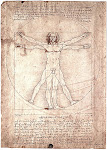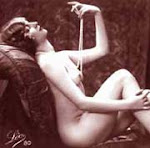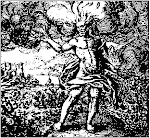
Greetings and salutations carnies and ballyhooers!
I, considering that my first post was a promise that my blog would contain myself, at least in part, thought, that it was high time to produce a piece of my own creative endeavours. And really, I'm hoping that this may inspire me to write some more.
It is an excerpt from a novel (half-complete) entitled The Carnivalesque, I picked this chapter because it almost stands alone. It is entitled Circus (N.) . Enjoy:
There is a circus inside Mr Abraham Brackets’ mind. It winds its way down the winding road of his cerebellum as he reads the enigmatic poster on the wall. It winds its way from the moor-lands of memory in brightly painted wagons. It parades through his childhood nostalgia with a barrel organ singing crudely like the screech of psirens ready to snare any unsuspecting memories and draw them up into the red canvassed lair.
Mr Abraham Brackets remembers his childhood and the circuses that lay quietly at the edges of the everyday with promises of vivid awe. They lay like festive beach houses. They lay like lions couched amongst the sepia savannah of youth, lapping their paws in the summer heat. There was something ephemeral about them. Something transient, like stumbling upon the fairies dancing. The big top rose and billowed and flourished in scarlet. It was a crazy dance of tent pegs and ropes, it sat squatting on the hillside above
And the tents were full to the top with carnies who stood invitingly with pied-piper smiles and sailor tattoos. There was something seedy that permeated the air. It was a vibrancy that comes with danger. It was the sense that all natural laws were frozen and here was a land of no consequences, a land where recriminations were the outlaw. They were like fairy-mounds, made of canvas and mist, and when you entered, a magical realm awaited where people flew through the air and animals walked about dressed as humans.
He attended once with his grandfather who seemed to possess more knees and elbows and swollen joints than all the sideshows put together.
“The circus was a place of bloodshed and sacrifice.” His grandfather grumbled darkly in the face of brightly coloured joy as Abraham Brackets, then a young boy, ran giddily to the menagerie.
“It’s a camel grandpa, look. Can I ride it?" His grandfather visibly paled then and walked bitterly away.
“In days of old we’d have slaughtered the animals at the circus, not played with them and ridden them.” The camel grunted and spat at his feet. Abraham Brackets found out by his mother years later that his grandfather embarrassed himself publicly by claiming a dead camel was in fact a dinosaur. -He never recovered from the ridicule. There was something fragile about his grandfather’s just-so well placed wisdoms. It’s funny how one little camel could rob a man of the capacity to enjoy such wild chaotic mirth that occurred in the fairy kingdom of a circus.
And then they were gone. Like fairy palaces that pass into the fog and gypsy caravans, the circus would leap on the caribou of Abraham Brackets’ days and splash it scarlet with fear and euphoria before padding silently away from sight where it licked its coat and slumbered in the African heat. The mountain realm of childhood nirvana had closed, and Abraham Brackets always felt like a frail crippled boy, too young and infirm to join the carnies in their ceaseless festival of wandering.
He always ran up to the hillside to watch the ponderous display of the circus setting up. He always saw the erection of the central pole that rose with wisps of spider silken hemp ropes trailing lazily from its peak like so many ribbons from a maypole. He heard in the fairy dawn-light the coarse gypsy singing of the carnies who worked bare-chested in the sun and dreamed of the loose women they could ensnare. And there was the methodical whistle of pulley wheels and the tapping of tent-pegs like a hail Mary, and lo! Oberon had set up court and visions and fancy was his trade.
But his childhood eagerness failed to alert him of the circus’ conclusion. Was it denial, he wondered, -an unwillingness to let the circus travel like the seasons travel onwards. All he knew was where he had once seen the industriousness of the big top’s set up, where he had been to enjoy the poppy fields within, he was often too late to witness the circus packing up for the road. There was nothing for his boyhood memory to watch, only the dead dusty grass and absence where once there had been a fairy palace and animals in suits served him fairy-wine.
There was something furtive about the way a circus packed up for the road. Something guilty. Something shameful. Setting up was stock and trade for the traveling shows. It was the promise of delight and ephemeral glory and transient joy. It was the budding of magic and free to be viewed by the eager and the young. But the packing up was a dirty behind-the-scenes affair, -a setting up for the village down the road. It was like seeing how a magic trick was performed with little to offer but disappointment. Perhaps that’s why they left so mysteriously, their preparations to leave made in the early-morning darkness, like an illicit affair. The town would awake to find its lusty
Once, when Mr Abraham Brackets was young and he and his grandfather went to see the circus that had flourished beside the town like a brightly colored infestation of glee, his grandfather, still aching over the demise of his reasoning, mumbled hollowly as they retreated from the menagerie.
“Circus, (ser’kas), (n.): A travelling show of acrobats, clowns horses, riders and wild animals. From the latin word ciculus, for circle. Properly the circular oval or oblong space or structure itself, in which such performances are staged. Contests amongst gladiators, chariot races and other such public spectacles took place in circuses in ancient
His grandfather could speak in italics and parenthesis and vocalize an abbreviation as though it were a word in itself. But Abraham Brackets was lost in the fairy glamor already. The barrel organ was singing and anyway it was difficult to hear his grandfather over the clicking of his knees that bent and recoiled in an ungainly dance that reminded him of a camel.
His grandfather sat grim and bitter by the world about him. The spell was powerless against the crushing bruises from the implosion of his ego. Where Abraham Brackets saw joy, his grandfather saw a gladiatorial ring. Where Abraham Brackets saw frivolity, his grandfather viewed carnage. He resided within his own leather clad hell which consisted of sword points and slaughtered animals and ave Caesars and a shrieking mob.
“Let’s see Anne Boleyn, the mermaid of
“There is no such thing.”
“How do you know, grandfather?”
“Because life would be wonderful if there was, son.”
How to argue in the face of such all encompassing depression? But they entered the sideshow anyway. -And there, in a tank full of water, floated a flame haired beauty with milk white skin and jade for eyes and the the most obviously fake mermaid tale ever to grace a den of hucksters.
“Told you son. She’s a fake.”
“I beg your pardon sir, but I am real.” Countered Anne Boleyn.
“Your tail’s a fake.”
“It is. But I am real.”
She stood up in the gaily colored tank.
She removed her tail.
And grandfather’s eyes glistened with the wonder of it all. For a minute the sounds outside the tents, the chattering, the giggles, the ballyhooing of the clowns outside, the hollow grinding of the fairground organ, all the sounds bled white and silent. And all Abraham Brackets could hear was the lapping of the water in Anne Boleyn’s tank and the short pained breaths of his transfixed grandfather, ensnared by a glamor.
“Do you sing?” He asked.
“Very well.” She countered, as open and honest as still water is honest.
“Do you swim?” Asked Anne Boleyn.
“Passably.” Answered his grandfather.
“Swim with me. Tonight. Not here. By the beach. I’ll show you where the mermaids are.”
“Will you sing for me?”
She sang for him then with a voice like brandy butter. And his grandfather, his bitter, camel hating grandfather wept. Tears streamed from his academic dusty old eyes and glistened in tracks on the side of his face. Something happened to him then as the salt water passed over his lips to his tongue. There was a softening to him, a soothing of all the angles in him. His shoulders dropped with the ease of it all, he lost the extra joints in his limbs, his skin seemed translucent and the ruler straight line that was his mouth curved enticingly into a smile.
Anne Boleyn was a Lady of the
“Will you swim with me?”
“Yes.”
“Tonight?”
“Yes.”
“Then I’ll show you where the mermaids swim.”
They left the tent in a daze with his grandfather grinning with a spring in his step.
“What was that song that she sang”
“It was French. From Carmen:
‘Toréador, en garde
Et song en combattant
Qu’un oeil noir te regarde
Et que l’amour t’attend.’”
“What did she sing?”
“It means:
‘Toreador, ‘e’er watchful be
Do not forget the brightest of eyes
Are fondly thee waiting,
And love is the prize.’”
“Can we go back and ride the camels?”
“We can do whatever you like.”
The next day the circus disappeared and with it disappeared Mr Abraham Bracket’s grandfather. The police were called to look for him, but no one believed an eight year old’s claim that his grandfather had fallen in love with a mermaid and had run off with the circus.
There was dust by the road and the half heard memories of pleasures partaken. The air was pregnant with the ache of morning-after joys. The traveling show had long gone. Oberon and entourage had moved back to
But Mr Abraham Brackets recalls fiercely the curve of his grandfather’s smile and still to this day travels to the hillside to watch the circus setup, and races at dawn to try and catch its departure. He is yet to be successful though and is left to peer short-sightedly at the diminished half-imagined grainy specks of wagons and fairy dust. And he wonders what if he were carried away to that fairy realm forever, would he see his grandfather, would he return sixty years later as though only a week had passed? Mr Abraham Brackets plays the heartening game of what-if. -And for this little beach-house coloured mystery in his everyday life, he is glad.












No comments:
Post a Comment